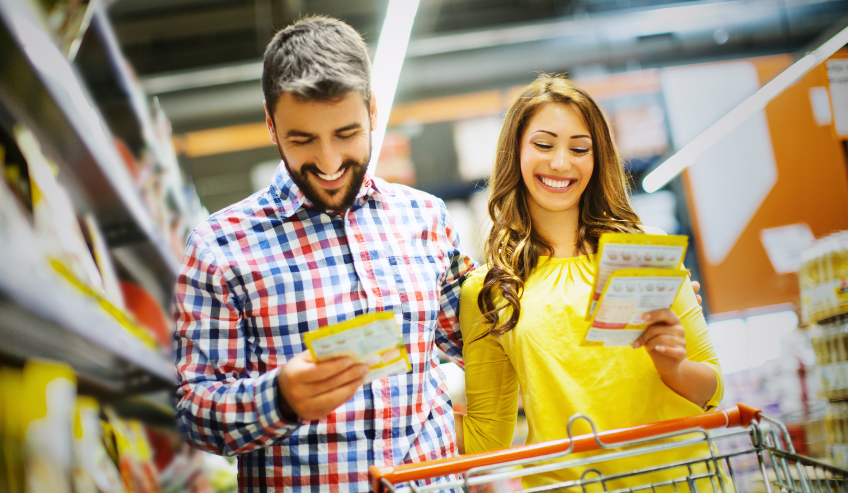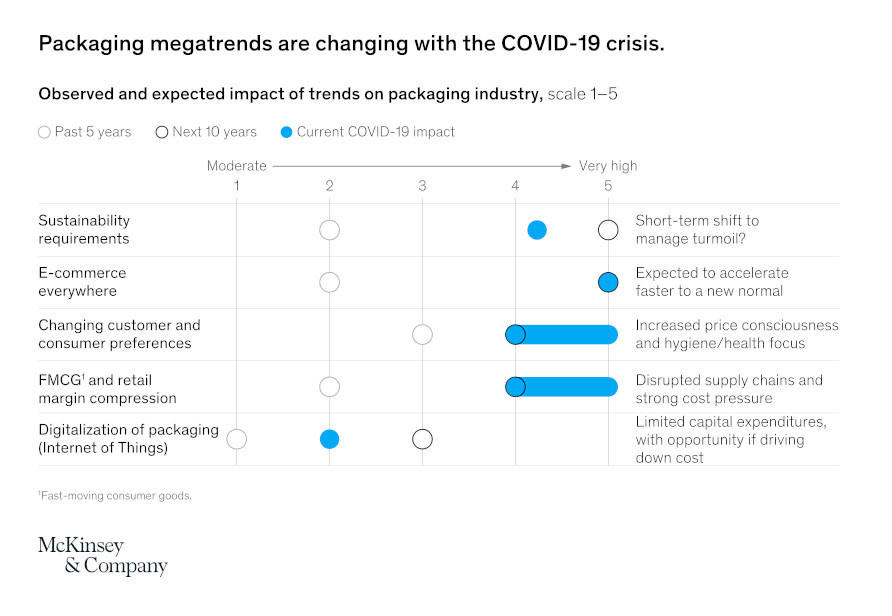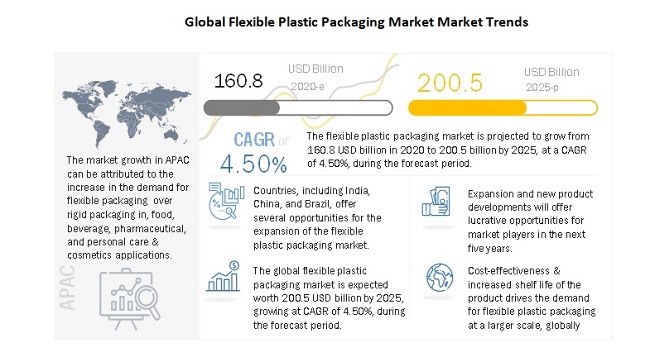
The Glue Talk Blog

What is the typical consumer’s current perception of food safety? Read on to learn more about the way H.B. Fuller is working to adapt to regulatory and market changes in the flexible packaging market caused by the pandemic.
Last year, COVID-19 spread across the globe and affected many economies and societies. However, manufacturing processes, innovation, food safety and sustainability were not forgotten during this crisis.
The packaging market underwent significant changes due to the COVID-19 pandemic. Specific markets faced massive adjustments on how they performed and operated, as demand for several flexible materials soared. For some perspective, these flexible materials are now expected to reach a new value of $248.6 billion in 2021.
Flexible Packaging Market Outlook
According to a global forecast by Smithers, the flexible packaging market is now recovering, as evidenced by a significant rise in sales, particularly in Asia. This growth also is occurring in North America and Europe, with the global forecast on market growth expanding at a compound annual growth rate (CAGR) of 3.2%. At this rate, it will rise to $294.1 billion by 2026. These indicators show that this market is responding quickly to challenges caused by the pandemic and is being influenced by both sustainability and innovation. In this new landscape, the flexible packaging industry has one constant: how foodstuff is packaged safely. This industry constant has become a megatrend due to the rise in demand across the world and is now one of the highest priorities for this market. And food safety owes its exponential rise to the increase in demand for to-go food during the pandemic, and is predicted to continue growing even as the pandemic recedes. The pandemic altered some of the megatrends that contribute to the way we expect packaging to perform and how we consume and interact with it.

Source: © 1996-2021 McKinsey & Company
Despite the smaller than expected growth in 2020-2021, the global flexible packaging market is currently witnessing a comeback for food, beverage, and other applications. The key players operating in this market aim to offer sustainable, environmentally friendly and food safe materials. As a result, this leads to packaging makers using more lightweight and recycled materials in their products to meet consumers concerns: food safety, sustainability and efficient packaging.

©2020 MarketsandMarkets Research Private Ltd. All rights reserved
Food Safety and E-commerce Accelerated during Covid
Both food safety and e-commerce witnessed an acceleration during Covid. Let’s have a look at the main aspects of this change:
- Due to lockdowns and a shortage of food stock, consumers became more accustomed to ordering fresh food through online channels, leading to an increase in the demand for flexible plastic packaging.
- The acceleration of e-commerce (especially aided by an explosion in online grocery shopping) continued to grow and is here to stay.
- Fast-moving consumer goods companies have responded to the demand in e-commerce and have called for more flexible plastic packaging products, which has increased the need for these solutions to ensure a timely delivery of materials and other products to their respective end users.
- Flexible packaging is expected to provide e-commerce solutions, either individually or in combination with corrugated packaging.
- With online shopping levels rising, there is a need for light, flexible packaging that is also food safe.
- Consumers have a heightened sense for food safety after being so concerned about the spread of COVID-19.
Read more on some of the potential effects the pandemic had on consumer behavior for this market.
Food Safety with Flexible Packaging During the Pandemic and Post-Pandemic
The adhesives used in the construction of flexible packaging play a significant role in the global food safety conversation. Flexible packaging helps ensure that fatty foods, such as meat, cheese and seafood are kept safe for consumption. Even though adhesives generally make up less than 5% of flexible packaging materials, unintended food contact with those adhesives may occur by migration through the packaging.
Consumers across the globe are increasingly buying their products online through different channels: home delivery, in store click and collect , collection point drop-off, and others. Even, as the pandemic slowly retreats, the rate of e-commerce shipments and other home-delivery services continues to accelerate.
However, consumers are generally less willing to pay more for essentials like groceries, and instead prefer to pick their own fresh items. Consumers also worry that fresh items could get damaged in transit. This presents some opportunities for growth in the grocery market, including lightweight products, fully recyclable packaging and products that prioritize convenience.
The role of packaging in food safety continues to grow and make large contributions to the discussion on packaging debate, since consumers are ordering more meals online and expect packaged foods to remain safe for extended periods of time.
Adhesive suppliers and other manufacturers of packaging materials must continue to monitor regulations and requirements as consumer safety is more closely examined and carefully balance the consumer need for convenience with food safety and sustainability.
Consumers care about the environment, but they are not necessarily willing to sacrifice other areas to buy sustainably. As consumers compare their options, they view each one through the triple lens of price, convenience and environmental impact.
Watch our video to learn more on food safety and on how we address the concern with materials of concern such as Epoxy-Silanes.
To address these changes and meet business goals, our Flextra™ flexible packaging epoxy silane free laminating adhesives formulations are designed to deliver high performance in this new, complex and fast-growing market.
As flexible packaging requirements continue to evolve and change in the aftermath of the pandemic to keep pace with consumer demand, our technical and market experts are partnering with our customers to provide the widest range of performance and regulatory clearance.
Collaboration Setting the Stage for Innovation
Regulation and compliance is paramount for success in this industry. We have a strong commitment with our partners to be closely aligned with what is required for the packaging industry – at all levels and for a wide range of applications – and also support the ongoing development of effective, adhesive-related safety regulations.
In partnership with FEICA – the association representing Europe’s adhesive and sealant manufacturers – we provide guidance on food contact status declaration for adhesives (which covers both the obligations of the adhesive supplier and those of the adhesive user) that are designed to address the existing regulatory gap on non-plastic materials.
To discover this and much more on our differentiated flexible packaging adhesive solutions, click here. You can learn more about food safe packaging here.
Blog Categories
Blog Categories
Archive
- 2024
- 2023
- 2022
-
2021
- January (3)
-
February (7)
- Celebrating Exceptional Service During COVID-19 Complications
- Cyanoacrylates: What They Are and What They Do
- Innovative two-shot bookbinding adhesive
- Make a Difference 2020
- Problem Solving: Paper Straws in Drinking Beverages
- Stronger straws sustainable future
- Substances of Interest in Disposable Absorbent Hygiene Products
- March (4)
- April (4)
- May (4)
- June (5)
- July (2)
- August (5)
- September (2)
- October (1)
- November (3)
- December (2)
-
2020
- January (4)
- February (2)
- March (3)
- April (4)
- May (3)
-
June (7)
- Community Support in the Era of Coronavirus
- HBFuller Employee Creates Face Shields with 3D Printer
- Improved Packaging Integrity and Greater Customer Satisfaction
- Liquid-Resistant Paper Straws
- What is a Sealant?
- What Is the Future of Commercial Disinfectants?
- Winning over consumers with e-commerce packaging solutions
-
July (6)
- Employees Take Action to be Part of Healing and Growth
- Gain a competitive advantage with packaging adhesive solutions
- HB Fuller Company Foundations Commitment to Communities
- Packaging Solutions for the South African Agriculture Market
- Supporting Organizations That Provide STEM Education for Youth
- Where Does Sustainability Stand Amid COVID-19
- August (3)
- September (2)
- October (4)
- November (2)
- December (4)
